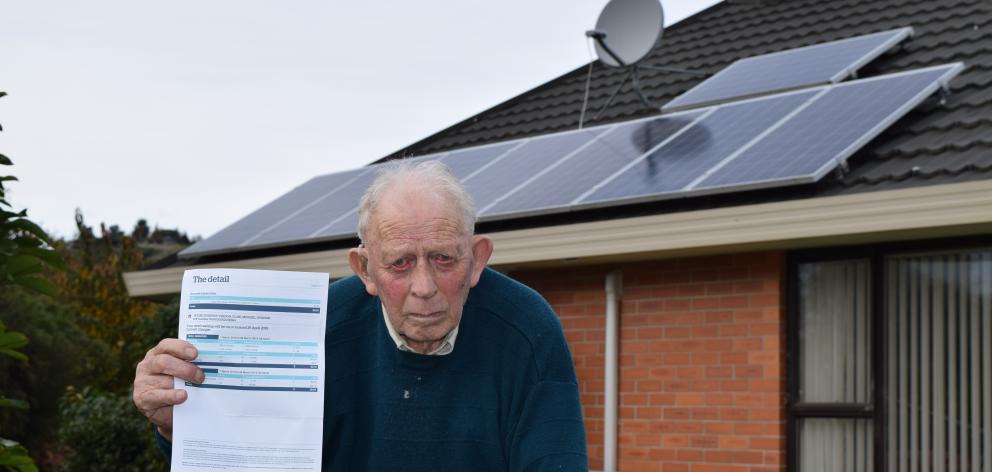
A Mosgiel pensioner is warning people against getting burnt financially by solar power.
Joe Morris (92), of Mosgiel, said he paid $7750 to get eight solar panels installed on the roof of his house about four years ago.
Before installing the panels he crunched the numbers and it made financial sense, including his electricity retailer, Meridian, paying him about 25c for each unit he sold back to the grid.
"I worked out the pounds, shillings and pence and it was a payable proposition.''
But the proposition was looking more like "a dead loss'' when Meridian dropped the export price to 8c nearly three years ago.
With his setup, he was selling a unit of power to Meridian for 8c and having to buy it back from it for 23.89c a unit.
"It's thievery.''
He could buy a battery for his solar system and store unused solar units rather than export them, but batteries were expensive, so he had no option but to sell them back for 8c a unit.
Solar energy was often touted as the future of clean green energy so it should be financially feasible to entice more people to install it, he said.
Meridian spokeswoman Claire Shaw said most people who had solar installed still needed to access electricity from the main electricity grid when their panels did not produce enough.
They also needed to be able to export electricity back to the grid when their solar panels generated more than they needed.
Because of this, the cost of using the grid needed to be covered as part of the solar tariff, in the same way as a tariff for non-solar customers reflected the costs of getting electricity to their home.
When solar customers sold electricity back into the grid, Meridian paid them a unit rate similar to the price it cost it to buy a unit from the spot market to supply its customers.
"Our solar tariff has been in place for almost three years and it is competitive.''
Energy Efficiency and Conservation Authority strategy general manager Jenny Lackey said the government agency advised anyone considering installing solar "to do your homework''.
"Our analysis is that it may take a very long time to get a return on your investment in solar.''
People should ask installers if their home got enough sunshine to get a good return on the investment.
Other homework included investigating how much electricity the household would need to buy, especially on cold, winter nights when the sun was not shining.
When considering a solar system, a maintenance cost should be factored in, she said.
People should investigate installing LED lighting, efficient heating and insulation in their homes.
"Those options are lower cost, save you money and are better for the planet.''
More information is available on the Energywise website www.energywise.govt.nz.
SHAWN.MCAVINUE @thestar.co.nz
Comments
This is where the Government should take control like in Aussie initially did. The Government here still pays part of the install which makes it 3 or 4 thousand dollars for the house hold, Initially they were paying people 49 or 54 cents which so long as they still owned the house they got that and still do. I know of a few people still on that 49 or 54 cents and get a credit from the power company. The house we bought has solar we got 13 cents now 16 cents, I work from home so I use most of l the solar generated power. Somebody like citizen advice needs to help this gentleman because the power companys should not be able to just change the rate like that, but I suspect there is more to the story
just like what electric cars will be like.... the government will also find a way to get uses to pay///// wait and see.....
Hmm.
"When solar customers sold electricity back into the grid, Meridian paid them a unit rate similar to the price it cost it to buy a unit from the spot market to supply its customers".
So solar customers get 8c a unit, it costs meridian a similar price to buy a unit from the 'spot market' yet consumers are charged (say) 20c and up for a unit.
The fellow is right .... "It's thievery.''
If owners of private personal solar units get a higher price for the electricity they generate than it would cost the distributor to buy from a large-scale generator, then the people who must pay for this highly priced power are those the distributor sells it to: those, who can't afford to install personal solar power. Since the price of electricity is made up roughly equally of the cost of generation, the cost of distribution and the cost of local area networks, then paying home generators 25c means the on-sale price has to be about 40c a unit. I would rather buy my power from a company that buys it from an efficient generator. Solar panels can only be made useful with the addition of batteries and then they become much more expensive and add to the landfill problem at the end of their too short lives.











